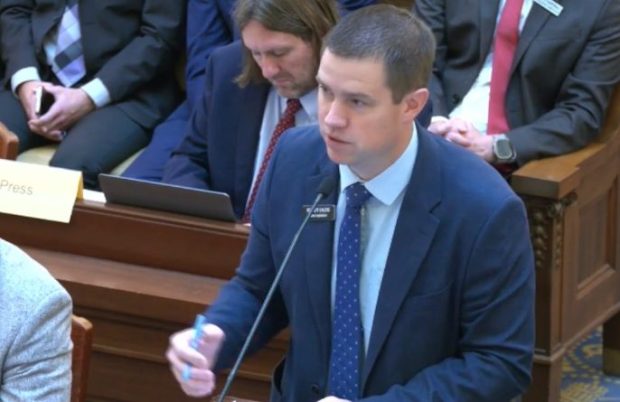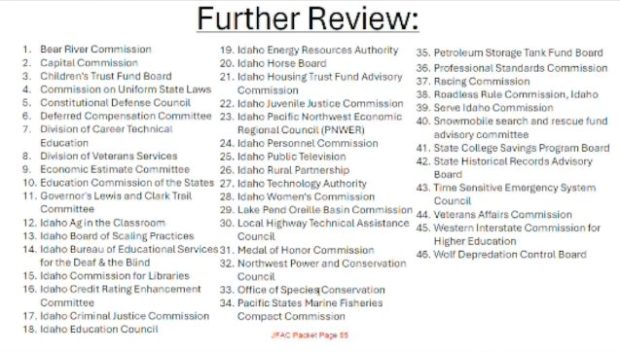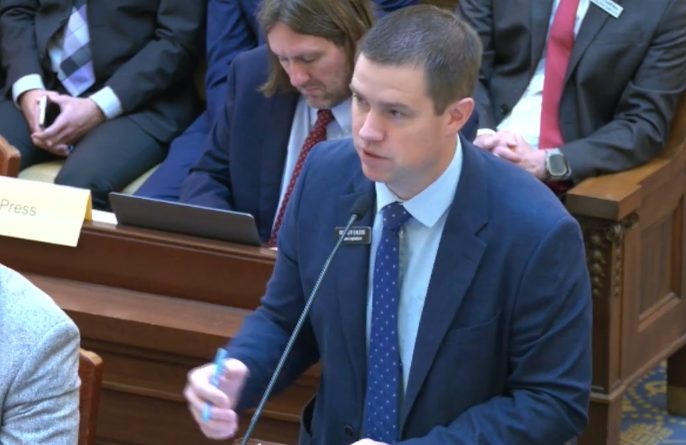The DOGE Task Force on Thursday delivered its first recommendation to the Legislature: Consider cutting state funds for vacant positions.
Chairmen of the Legislature’s cost-cutting task force delivered the recommendation to the Joint Finance-Appropriations Committee (JFAC), which is meeting this week in Boise ahead of next year’s legislative session. It was also the first opportunity for JFAC members to comment on DOGE’s work since it started meeting in July.
Republican legislative leaders created the task force earlier this year and appointed Rep. Jeff Ehlers and Sen. Todd Lakey as co-chairmen. The task force’s name is a nod to Elon Musk’s Department of Government Efficiency, a federal cost-cutting initiative.
DOGE doesn’t have authority to cut spending or consolidate agencies — only to make recommendations to the Legislature. One suggestion was ready for prime time Thursday. Ehlers, R-Meridian, told JFAC that it should scrutinize state funding for vacant employee positions.
The Legislative Services Office recently gave DOGE a report that showed a five-year average of vacancies from each state agency. The statewide average during that span was 381 vacancies — positions supported by $57 million, including $48.7 million from the state’s general fund.
JFAC should evaluate the vacant positions and cut funding for the “ones deemed unnecessary,” Ehlers said. “We feel that your process is already in place to talk to these agencies, to have them come forward and present their case for which (positions) they need or which positions they don’t need.”
 Rep. Jeff Ehlers, co-chairman of the DOGE Task Force, reports to the Legislature’s Joint Finance-Appropriations Committee at the Idaho Statehouse on Nov. 6, 2025. (Screenshot via Idaho In Session)
Rep. Jeff Ehlers, co-chairman of the DOGE Task Force, reports to the Legislature’s Joint Finance-Appropriations Committee at the Idaho Statehouse on Nov. 6, 2025. (Screenshot via Idaho In Session)
Looking ahead, the task force is focused on consolidating the state’s hundreds of agencies, divisions and boards. But this effort will take more than a few months, said Lakey, R-Nampa. “It looks like a multi-year effort.”
Sen. C. Scott Grow, JFAC’s co-chair, applauded the task force for digging deep on details. “We’ll be very interested in what comes from recommendations,” said Grow, R-Eagle.
Other reviews were mixed.
 Sen. Todd Lakey, R-Nampa
Sen. Todd Lakey, R-Nampa
Both Republicans and Democrats zeroed in lists of organizations that DOGE is reviewing for consolidation — or elimination. They urged the task force to be proactive about gathering input and weighing potential effects.
One list, which DOGE labeled “low-hanging fruit,” includes 13 consolidation ideas with “most opportunity to effectuate,” Lakey said. For instance, the state could move the STEM Action Center into the Workforce Development Council.
But a separate, much longer list includes 46 agencies, divisions and boards that will undergo “further review.” Education-related organizations on the list include the Idaho Commission for Libraries, the Professional Standards Commission and the Division of Career Technical Education.
Sen. Jim Woodward questioned whether the task force is soliciting input from the organizations or studying the history behind their creation. “This looks, to me, more like a list of what exists, versus something we’ve potentially identified a problem with,” said Woodward, R-Sagle.
 A list of 46 agencies, divisions and boards that the DOGE Task Force is considering for “further review” as part its consolidation effort.
A list of 46 agencies, divisions and boards that the DOGE Task Force is considering for “further review” as part its consolidation effort.
The task force is considering legislative history, and it’s inviting agency leaders to weigh in, Lakey responded. Ehlers added that people have “jumped” to assume DOGE will recommend elimination for every agency on the list. But some will be reviewed for “scope creep,” or inching outside the bounds of their legal authority.
“We will certainly, as we go along, do our homework,” Ehlers said. “We’re committed to that.”
 Sen. Jim Woodward, R-Sagle
Sen. Jim Woodward, R-Sagle
Other Republicans urged the task force to consider whether consolidations will, in fact, improve efficiency. Merging “huge agencies” like the departments of Finance and Insurance — one DOGE idea for future consideration — could make budgeting less transparent, said Rep. James Petzke, R-Meridian.
A Democratic leader, meanwhile, questioned why DOGE exists. A bill to create the task force, House Bill 364, failed during the last legislative session. The bill cleared the House, overcoming bipartisan opposition, but the Senate didn’t vote on it. GOP leaders from the House and Senate created the task force anyway.
“I’m pretty flabbergasted here, I guess,” said Senate Minority Leader Janie Ward-Engeling, D-Boise.
House and Senate leadership has “broad discretion” when it comes to creating interim committees, Ehlers said. “That’s where it came about, and that’s where we got our charge, essentially.”
DOGE’s next meeting is scheduled for Nov. 19.
